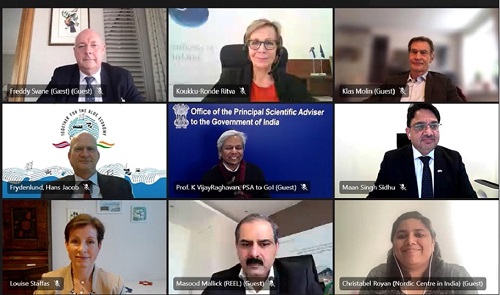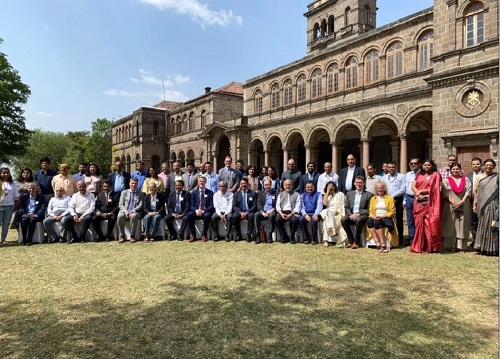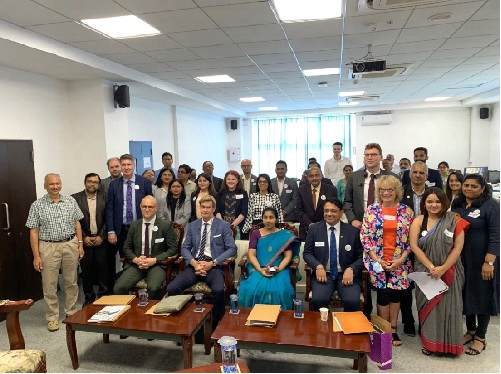The Nordic-India Innovation partnership project (NordicsInIndia) aims to promote and showcase Nordic research-based innovations and solutions to encourage a green transition in India. NordicsInIndia builds collaboration among the Science and Technology Counsellors at the four Nordic embassies (Norway, Finland, Denmark, and Sweden). While highlighting the Vision2030, the NordicsInIndia will work to increase cooperation in science, technology, and business between Nordics and India in the field of carbon neutrality and a sustainable circular and biobased economy. The project targets highly prioritized Indian infrastructure programs (for example WastetoWealth mission and Smart City Mission) and initiatives in green transition. The NordicsInIndia will bring Indo-Nordic capacities, including companies, research institutions, investors, and public authorities, into close dialogue.
As part of the Nordic-India Innovation Partnership Project, a high-level Nordic-Indian policy dialogue on the national level was organized. This policy dialogue on sustainable, circular, and bio-based economy on the national level aims to provide a platform for peer-to-peer discussions on innovation, technology, policy amongst experts from governments, academia, and industry from India and Nordic countries. It will promote Nordic interests through interaction between Nordic and Indian experts, policymakers, companies, and researchers. The dialogue meeting will lead to meaningful knowledge sharing, exchange of ideas, information and experience, and market entry/expansion for Nordic solutions in India, on various aspects of sustainable, circular, and bio-based economy.
The session was conducted with the cooperation of the office of Prof. K. Vijayaraghavan Principal Scientific Adviser to the Government of India and was presided over by other government functionaries and dignitaries saw the participation of various people in the sphere of innovation and research from leading institutions in India and the Nordic countries. The session also saw the presence of the Ambassadors from representative Nordic countries.

Delegates at the National Level Nordic-Indian Policy Dialogue
The NordicsinIndia are committed towards joining hands with the leading states in India to explore research and innovative collaboration opportunities in the areas of circular and bio-economies. In line with this commitment, the NordicsInIndia plan to engage Nordic delegations (researchers, companies, and policymakers) in two Indian cities: Pune and Bengaluru, that are being positioned centrally in and are committed to India’s green transition. The delegations in collaboration with Indian stakeholders will conduct theme-based workshops under sustainable, circular, and bio-based economy. The invited stakeholders will include governmental authorities (urban development department, municipal corporation etc.), leading companies, key research, and technical institutes with an ambition to establish relationships and joint innovation and research projects. The workshop will also cater to the strong need to setup research collaborations among leading research agencies and universities from Nordic countries and India to develop next-generation circular economy solutions that can be tested in local conditions.
The workshop in Pune was organized in collaboration with the Savitribai Phule Pune University (SPPU), and saw the participation of professors, educators, and researchers from spheres of environmental sciences, defence and strategic studies, and others. The session was coordinated by Dr Maan Singh Sidhu Project Coordinator, NordicsInIndia, and Counsellor for Science, Technology & Higher Education, Royal Norwegian Embassy in India. Representatives from all Nordic countries were also presentRepresentatives from all Nordic countries were also present.
Talking about Savitribai Phule Pune University (SPPU) and its strategic placement in this initiative, Professor Suresh Gosavi, Head, Department of Environmental Sciences, spoke about how SPPU is always one-step ahead, when it comes to implementing international issues. SPPU has been working on many new fronts, such as with Norway on the material for energy production, on bio-hydrocarbon generation, and also have started working on PPE kits to hydrocarbon, where the yield is 65 %, which saves 35 %. Being one-step ahead on their carbon footprint, they have also set up a power plant in Shivre village.

Delegation at the NordicsInIndia Workshop at SPPU, Pune.
The two parts of the session at Pune were dialectically designed, wherein the first session cited the Nordic strengths and interests in the bio-economy followed by the next which highlighted the perspectives, opportunities, and challenges prevalent in an Indian setting. This dialogue would become highly imperative in understanding the position of Indian industry vis-à-vis the development of institutions related to circular economy and how the Nordic expertise and experience can help fill the lacunae.
The session at Bangalore was conducted under the purview of Director Electronics, Information Technology and Biotechnology at Govt. of Karnataka and was coordinated by Dr Maan Singh Sidhu Project Coordinator, NordicsInIndia, and Counsellor for Science, Technology & Higher Education, Royal Norwegian Embassy in India. Representatives from all Nordic countries were also present.
Famous for being the world’s third largest and fastest growing start-up nation, India, and especially Bangalore has been and continues to be an epicentre for that development. One of the focus areas is Bioeconomy. With a great mix of research, entrepreneurship and business, Bangalore has a strong bioeconomy ecosystem and is home to prominent life science corporates and highly interesting start-ups and the same can be said about Copenhagen and Denmark. Therefore, Innovation Centre Denmark Bangalore works closely with the ECHO Network and the Danish Academy of Technical Sciences to connect these ecosystems in order to share knowledge, transfer technology and ultimately solve global challenges together.

NordicsInIndia Delegation at Bangalore
For more information on the policy initiative and the workshops conducted, click here to download and read the full report.
The event was covered by various news agencies. Following is a list of a few: